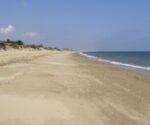Sir Keir Starmer warns Middle East crisis could spiral beyond region | Politics | News
Sir Keir Starmer has warned there is a risk of the Middle East crisis spiralling beyond the region after Donald Trump ordered US planes and submarines to attack Iran’s nuclear programme. The Prime Minister urged all sides to return to negotiations but said he had taken “all necessary measures” to protect British interests in the region if the conflict escalates.
Sir Keir confirmed there was no British involvement in the action but the Government was informed before the US strikes. The PM chaired a meeting of the Government’s Cobra crisis committee on Sunday afternoon and has held a series of calls with world leaders.
Tehran has threatened to retaliate and Mr Trump has warned of further US action if necessary, saying: “There will either be peace or there will be tragedy for Iran.”
The Prime Minister said there was a “risk of escalation” adding: “That’s a risk to the region. It’s a risk beyond the region, and that’s why all our focus has been on de-escalating, getting people back around to negotiate what is a very real threat in relation to the nuclear programme.
“In relation to the UK, we were not involved in the attack. We were given due notice, as we would expect, as close allies to the US, and we have been moving assets to the region to make sure we’re in a position to protect our own interests, our personnel and our assets, and, of course, those of our allies.”
The US action comes just days after Sir Keir, who attended the G7 summit in Canada with Mr Trump, said on Tuesday there was “nothing” from the president to suggest he was about to get involved in the conflict.
Mr Trump pushed ahead with the action anyway, which he claimed had “completely and fully obliterated” key nuclear facilities.
Asked if he had been left looking foolish by the UK’s closest ally ignoring his calls for de-escalation and pushing ahead with military strikes, the Prime Minister said: “It’s clearly a fast-moving situation and there’s been a huge amount of discussion in the days since the G7 ended.”
The Prime Minister sought to dodge questions about whether the UK could get dragged into the conflict if Iran targeted the bases of the US, a Nato ally.
“I’m not going to speculate about what may happen, because all of my focus is on de-escalation,” he said.
“But I do want to reassure the public we have taken all necessary measures to protect UK interests, UK personnel and to work with our allies to protect their interests as well.”
Extra RAF Typhoon jets have already been moved to the region and Defence Secretary John Healey said “force protection is at its highest level” following the US strikes.
The US attacked Fordo, Isfahan and Natanz which are linked to Iran’s nuclear programme.
The Tehran regime has insisted its nuclear programme is peaceful but its uranium enrichment process has gone far beyond what is required for power stations.
According to details released by the Pentagon:
– The strikes, which had the codename Operation Midnight Hammer, involved more than 125 aircraft.
– A complicated decoy operation was used, with one group of bombers flying west over the Pacific in a move widely documented on social media by aviation enthusiasts, while the “strike package” of seven B-2s secretly flew east across the Atlantic.
– During the 18-hour flight to Iran, the stealth bombers were refuelled several times then linked up with escort aircraft once over land.
– At around 2.10am in Iran the first bunker-busting massive ordnance pentrator (Mop) bombs were dropped on the Fordow nuclear base.
– A total of 14 Mops were dropped across two of the nuclear sites.
– No Iranian shots were fired at the bombers during the mission.
– A US submarine launched more than two dozen Tomahawk missiles at Isfahan, which struck the target after the B-2 raids to maintain the element of surprise.
– The initial assessment is that “all three sites sustained extremely severe damage and destruction”, chairman of the joint chiefs of staff General Dan Caine said.
Conservative leader Kemi Badenoch said: “By targeting Iran’s nuclear sites, the US has taken decisive action against a regime that fuels global terror and directly threatens the UK.
“Iranian operatives have plotted murders and attacks on British soil. We should stand firmly with the US and Israel.”
Reform UK leader Nigel Farage also backed Mr Trump’s decision to strike Iran.
He said: “Iran must not be allowed to have nuclear weapons, the future of Israel depends on it.”
Liberal Democrats leader Sir Ed Davey said “robust diplomacy” was now needed to eliminate Iran’s nuclear threat, adding: “Following the US strikes, it is essential that we work to de-escalate the conflict and achieve that diplomatic solution.”
Scotland’s First Minister John Swinney called for diplomacy, saying the Middle East conflict has reached “an alarmingly greater level of danger after the US attacks on Iran”.
Iran launched a ballistic missile barrage against Israel in retaliation to the US action.
The foreign ministry in Tehran issued a statement condemning “the United States’ brutal military aggression against Iran’s peaceful nuclear facilities”.
It added: “The Islamic Republic of Iran is resolved to defend Iran’s territory, sovereignty, security and people by all force and means against the United States’ criminal aggression.”
Mr Trump said any retaliation would be met with “force far greater” than that used in the initial strikes.








